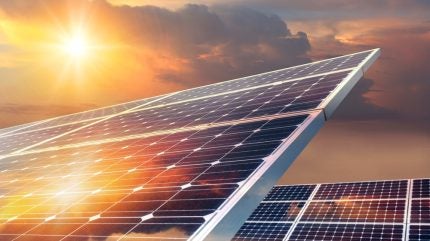
It is hard to imagine a world without energy. From kitchen lights to lifesaving medical equipment and everything in between, energy is essential to both our economies and livelihoods.
Yet, in today’s uncertain geopolitical environment, the UK’s reliance on energy imports – making up 44.4% of the UK’s primary energy in the first quarter of 2024, according to a recent report from the UK’s Department for Energy Security and Net Zero (DESNZ) – has left the country vulnerable to volatile energy prices.
Such vulnerability was particularly evident in 2022, during which the UK’s import dependency stood at 37.3%. Russia’s war in Ukraine saw the wholesale price of gas hit record highs, which, coupled with the UK’s overreliance on gas, led the country to be the worst hit by the shocks in western Europe. It is no secret that the impact was felt across the economy.
As society continues to grapple with constant geopolitical shifts, from the war in Ukraine to the conflict in the Middle East, the world is also head-to-head with the climate emergency. As a result, the UK can no longer afford to continue its reliance on foreign energy imports – especially oil and gas imports – to keep our economy moving sustainably. A failure to do so will not only see the country miss net-zero targets but also heighten the risk of future energy volatility.
However, the world of energy is not all doom and gloom. It is well recognised that renewable energy solutions such as solar PV and wind are not only the most sustainable in fuelling our global energy needs, but the cheaper option too. This was particularly evident in the UK just six months into the Ukraine war, when the price of gas reach nine-times that of renewables. This trend is expected to continue, with the DESNZ predicting that renewables will become 61% cheaper than gas come 2025.
Solar leads the charge
Despite many challenges, 2023 was a record-breaking year for renewable energy. The International Energy Agency (IEA) reported 50% growth in renewable capacity to 510GW, marking the fastest growth in two decades.
Equally as impressive – albeit, less surprising – is that solar power accounted for three-quarters of this growth.
The IEA also said that global investment in clean energy this year is set to reach $2trn, twice the amount going into fossil fuels. Here too, solar will lead the charge, with global investment in solar PV expected to grow to $500bn in 2024, the most ever spent on any power generation technology.
Given these recent trends, it is hard not to recognise the sheer growth of solar across the world. According to Power Technology’s parent company GlobalData, the global solar market grew from a cumulative installed capacity of 227.4GW in 2015 to 1.48TW in 2023, with an addition of 371.7GW in 2023 alone, and is set to reach 7.51TW by 2035.
Solar’s popularity largely stems from its cost-effective nature, such as low production and maintenance costs, not to mention solar is the most abundant of all energy sources. Investment in solar PV has become even more appealing as solar module prices have declined in recent years.
The growth in solar worldwide is a positive signal for energy security. Every solar panel installed will provide direct benefits to energy systems of the UK and beyond.
The more reliant we become on renewable energy over other energy sources, the more protection the world will have against volatile energy markets driven by anything from geopolitical conflict to climate disaster.
PPAs can help power the future of our energy systems
Whether it be the Conservative Government’s ambitious targets to increase the UK’s solar capacity to 70GW by 2035 (a near fivefold increase from today’s capacity) or Labour’s plans to transform the UK into a clean energy superpower by 2030, there is a clear consensus on the UK’s clean energy future.
Whilst much of this support is largely driven by the urgent need to tackle CO₂ emissions and reach net zero targets, solar’s potential to protect the economy from future energy volatility has not gone amiss.
However, reaching such targets will require action across the board – from businesses and households to local authorities.
Representing 18% of the UK’s total CO₂ emissions, businesses in particular are well placed to ramp up the country’s solar capacity. The demand is there too, as nearly half of UK companies now have structured plans in place to cut their carbon footprints, a figure that has increased by 34% compared with the year before.
In fact, today businesses across the country are already powering operations through renewable energy, with some of the world’s largest already powering up to 75% of domestic operations through solar energy alone. Much of this has been made possible, and financially attractive, through PPAs.
A PPA allows businesses – from major retailers such as Tesco and Amazon through to local authorities – to benefit from clean energy by entering into fixed, long-term contracts to purchase the electricity generated by the system.
Crucially, it is the signing of this agreement that unlocks investment into the solar project. In doing so, the business is able to point to their direct contribution to decarbonising the UK – a far cry from the practice of sourcing energy from the grid and buying ‘green credits’.
The long-term, fixed contracts take away UK business’s exposure to volatile energy changes, providing both protection and certainty, as well as cheaper energy costs. It also enables businesses to fully trace their energy, so they can reap the benefits of improved EPC ratings alongside a reduced carbon footprint, helping to meet scope 2 emissions guidance and reporting.
The clear benefits of PPAs are reflected in their year-on-year global market growth. According to BNEF’s 1H 2024 Corporate Energy Market Outlook report, corporations’ publicly announced solar and wind PPAs are for 46GW – up 12% from the record of 41GW the previous year and an amount equivalent to the total capacity of countries like Argentina.
Maintaining the momentum for a brighter, cleaner and secure energy future
Last year’s solar momentum speaks for itself. Businesses, households and governments around the world are seeing solar as the route for cutting costs as well as climate impact, and in turn, delivering a secure energy future.
With ambitious targets set and the technology ready to go, the UK is well placed to dramatically scale its solar capacity. Such a landscape is already empowering businesses to deliver on decarbonisation plans, while the likes of PPAs are making those plans both attractive and entirely achievable.
As we continue to face uncertainty, both geopolitically and environmentally, the UK – and more broadly, the world – must continue to push ahead with the solutions we know can deliver a cleaner, more secure energy future. By doing so, we can ensure that no matter the challenge, we will have a dependable homegrown energy system to keep our people and economies moving.

About the author: Gurpreet Gujral is the managing director of renewable energy at Atrato Group. With more than 15 years of experience in the renewable energy sector, he has worked in both public and private capital markets.


